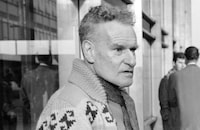I Stand Condemned
Brief Synopsis
Cast & Crew
Anthony Asquith
Laurence Olivier
Penelope Dudley Ward
Harry Baur
Athene Seyler
Robert Cochran
Film Details
Technical Specs

Synopsis
In 1916, the armies of Kaiser Wilhelm reach Russia. In a Russian Red Cross hospital, Captain Ignatoff, suffering from a leg wound, is tended by the beautiful nurse Natasha. Natasha is the nineteen-year-old daughter of the late Russian general Kovrin, who left his family in debt. Eager to keep her estate from being repossessed, Natasha's mother has arranged a marriage between Natasha and wealthy middle-aged grain merchant and war profiteer Peter Briokoff, who comes from peasant stock. Natasha's Uncle Nicholas opposes the marriage, however, because he knows Natasha does not love Briokoff. Ignatoff's ward roommate Polonsky is released from the hospital and appointed to Army Section C, counter-espionage. Meanwhile, Ignatoff falls in love with Natasha and kisses her, but she pretends she doesn't love him. German planes then bomb Russian supplies, and Polonsky suspects Section C agent Petrovsky of leaking information to German Intelligence. Before Petrovsky can be arrested, however, elderly German secret agent Anna Steinbach, posing as the kindly and daft Madame Anna Sablino, has him murdered so that it appears that he committed suicide. Ignatoff replaces Petrovsky in the Ministry of Supplies, and Anna schemes to win his confidence. Ignatoff swears his love to Natasha, but before she can reciprocate, Briokoff interrupts them. Ignatoff insults him for being a war profiteer, and Natasha defends her fiancé. Later, when Ignatoff plays cards with Briokoff and loses 80,000 rubles to him, Briokoff orders Ignatoff to repay him in three days. Anna befriends Ignatoff by offering to get him a loan to repay Briokoff. When Natasha overhears the nurses intimate that, as an honorable soldier, Ignatoff would kill himself if he could not pay his debt, she accuses Briokoff of murdering Ignatoff out of unfounded jealousy, and he agrees to send Ignatoff a receipt of payment. At the Red Cross ball, Anna intervenes to get Natasha and Ignatoff alone together. When Briokoff catches them kissing, Ignatoff tells him that he, Ignatoff, will marry Natasha. Polonsky, meanwhile, discovers that a supposedly deaf and dumb beggar outside the Red Cross hospital is really a spy. The coins Anna has been giving him contain clues to the Russian 5th Army offensive. Following the ball, Ignatoff visits Anna, who gives him 80,000 rubles and asks for information as repayment. Ignatoff immediately rises to call for her arrest, but Polonsky enters seeking to arrest Anna Steinbach. Anna takes a poisoned pill before she can be arrested, and Ignatoff is accused of treason. During his interrogation, Ignatoff tells the truth about his gambling debt, but the authorities find Briokoff's receipt in his room and assume Anna's payment must have been for information. Briokoff is subpoenaed for the next day's court-martial, and Natasha, pleading with him to save Ignatoff's life once again, offers to marry Briokoff, but he throws her out after she can't bring herself to say she loves him. Briokoff arrives at the trial prepared to send Ignatoff to his death, but, after taking an oath of honesty by kissing the cross and imagining Ignatoff's execution, he undergoes a spiritual regeneration and cannot tell a lie. He admits he wrote the receipt although Ignatoff did not pay him, and Ignatoff is exonerated. Ignatoff marches off to war, and Natasha waves at him from her balcony.

Director

Anthony Asquith
Cast

Laurence Olivier
Penelope Dudley Ward
Harry Baur
Athene Seyler
Robert Cochran

Morton Selton
Walter Hudd
Kate Cutler
Charles Hallard

Charles Carson
Edmund Willard
Morland Graham
Hay Petrie
Sam Livesay
Richard Webster
Crew

Film Details
Technical Specs

Quotes
Trivia
Notes
This film was the first feature production of Denham Productions and the first release of C. W. Woolf's General Film Distributors of Great Britain. This film was released in Great Britain under the title Moscow Nights and was screened in London at a length of 77 minutes. The film was a remake of the 1934 French film Les Nuits de Moscou, which was directed by producer Alexis Granowsky and also starred French character actor Harry Baur. According to Variety, this was Baur's first effort in English, which he had never spoken before making this film. Variety conjectures that Baur's speeches were dubbed, but adds that if they were, it was a perfect dubbing. The unidentified French songs in the film May have been borrowed from the original. A modern source lists Max Schach as the third producer (in addition to Granowsky and Korda) and lists his Capitol Films as a production company in addition to Denham Productions and London Films, with the explanation that Schach was closely tied to General Film Distributors, who distributed the film in Great Britain. The same source also lists Muir Mathieson as music director and John Armstrong as costume designer.












